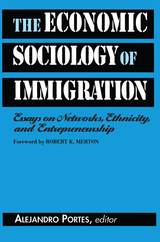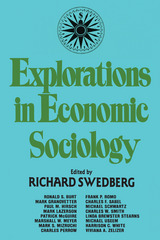2 books about Economic Sociology

The Economic Sociology of Immigration
Essays on Networks, Ethnicity, and Entrepreneurship
Alejandro Portes
Russell Sage Foundation, 1995
"Portes suggests that immigration constitutes an especially appropriate Mertonian 'strategic research site' for economic sociology in that it provides very good opportunities for investigating the embeddedness of economic relationships in social situations....the contributors expand the conventional domain of economic sociology quite literally in both time and space."—Contemporary Sociology "Alejandro Portes and his splendid band of collaborators make clear that the causes, processes, and consequences of migration vary dramatically from group to group, that a group's history makes a profound difference to its fate in the American economy. They have produced a sinewy book, a book worth arguing with."—Charles Tilly, Columbia University The Economic Sociology of Immigration forges a dynamic link between the theoretical innovations of economic sociology with the latest empirical findings from immigration research, an area of critical concern as the problems of ethnic poverty and inequality become increasingly profound. Alejandro Portes' lucid overview of sociological approaches to economic phenomena provides the framework for six thoughtful, wide-ranging investigations into ethnic and immigrant labor networks and social resources, entrepreneurship, and cultural assimilation. Mark Granovetter illustrates how small businesses built on the bonds of ethnicity and kinship can, under certain conditions, flourish remarkably well. Bryan R. Roberts demonstrates how immigrant groups' expectations of the duration of their stay influence their propensity toward entrepreneurship. Ivan Light and Carolyn Rosenstein chart how specific metropolitan environments have stimulated or impeded entrepreneurial ventures in five ethnic populations. Saskia Sassen provides a revealing analysis of the unexpectedly flexible and vital labor market networks maintained between immigrants and their native countries, while M. Patricia Fernandez Kelly looks specifically at the black inner city to examine how insular cultural values hinder the acquisition of skills and jobs outside the neighborhood. Alejandro Portes also depicts the difference between the attitudes of American-born youths and those of recent immigrants and its effect on the economic success of immigrant children.
[more]

Explorations in Economic Sociology
Richard Swedberg
Russell Sage Foundation, 1993
Since the mid-1980s, as public discourse has focused increasingly on the troubled economy, many social scientists have argued the need for more analysis of the social relationships that undergird economic life. The original essays in Explorations in Economic Sociology represent the most important work in this renewed field and employ a rich variety of research methods—theoretical, ethnographic, and historical—to illustrate its key concerns. Explorations in Economic Sociology forges innovative social theories of such economic institutions as money, markets, and industry. Although traditional economists have identified markets as driven solely by the forces of supply and demand, social factors frequently intervene. Sales at auction are determined not simply by a seller's personal knowledge of customers. Shareholder attitudes and employee organization influence everything from the way firms borrow money to the way corporate performance is measured. Firms themselves operate in social networks in which trust is a crucial factor in settling the terms for cooperation or competition. Throughout the essays in this volume, the contributors point the way to developing a more healthy economy by fostering productive industrial networks, avoiding disintegration at management levels, and anticipating the consequences of the shift from manufacturing to service industries. Explorations in Economic Sociology is a pioneering work that bridges the gap between social theory and economic analysis and demonstrates the importance of this union in achieving an effective understanding of economic issues. The book should stimulate new interest in economic sociology by bringing together many of its most fundamental voices.
[more]
READERS
Browse our collection.
PUBLISHERS
See BiblioVault's publisher services.
STUDENT SERVICES
Files for college accessibility offices.
UChicago Accessibility Resources
home | accessibility | search | about | contact us
BiblioVault ® 2001 - 2024
The University of Chicago Press









